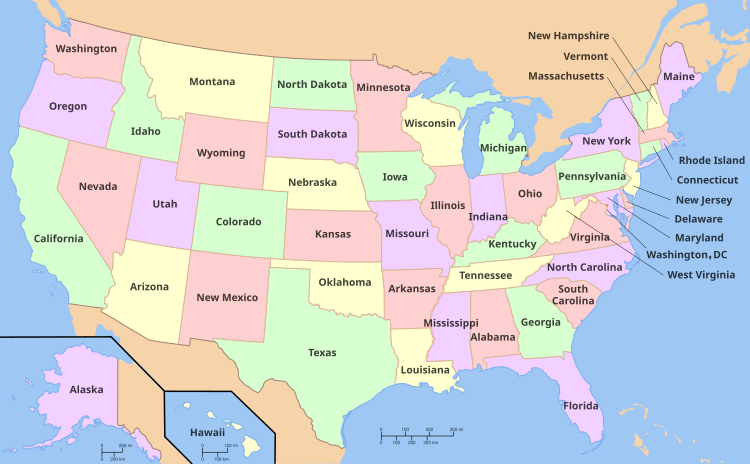U.s. State: Constituent political entity of the United States of America
In the United States, a state is a political entity.
There are currently 50 of them, and they are bound together in a federation. Each has a government and can make laws over a particular area that the state covers. All states have a shared sovereignty with the U.S. federal government. People who were born or naturalized in states are citizens of both the United States and the state they are in.People can move between states without asking or saying so, unless a court has said they can't. Four states call themselves "commonwealths" in their official names. Washington, D.C. is a federal district and not a state nor in a state.
States divide their territory into counties, or something similar with different name, which are not sovereign. Most states give their counties some government authority; a few states give them none. State governments get their power from the people of that state. States have a number of States' rights under the United States Constitution. States and the people that live in them are represented in the United States Congress, in the Senate and the House of Representatives. Each state also selects electors (an equal number to the number of Senators and Representatives from that state) to vote in the Electoral College, which elects the President of the United States. Puerto Rico, a territory of the United States, is considered as a possible 51st state for the future.
States of the United States
The 50 states, in alphabetical order, along with each state's flag:
 Alabama
Alabama Alaska
Alaska Arizona
Arizona Arkansas
Arkansas California
California Colorado
Colorado Connecticut
Connecticut Delaware
Delaware Florida
Florida Georgia
Georgia Hawaii
Hawaii Idaho
Idaho Illinois
Illinois Indiana
Indiana Iowa
Iowa Kansas
Kansas Kentucky
Kentucky Louisiana
Louisiana Maine
Maine Maryland
Maryland Massachusetts
Massachusetts Michigan
Michigan Minnesota
Minnesota Mississippi
Mississippi Missouri
Missouri Montana
Montana Nebraska
Nebraska Nevada
Nevada New Hampshire
New Hampshire New Jersey
New Jersey New Mexico
New Mexico New York
New York North Carolina
North Carolina North Dakota
North Dakota Ohio
Ohio Oklahoma
Oklahoma Oregon
Oregon Pennsylvania
Pennsylvania Rhode Island
Rhode Island South Carolina
South Carolina South Dakota
South Dakota Tennessee
Tennessee Texas
Texas Utah
Utah Vermont
Vermont Virginia
Virginia Washington
Washington West Virginia
West Virginia Wisconsin
Wisconsin Wyoming
Wyoming

References
This article uses material from the Wikipedia Simple English article U.S. state, which is released under the Creative Commons Attribution-ShareAlike 3.0 license ("CC BY-SA 3.0"); additional terms may apply (view authors). Content is available under CC BY-SA 4.0 unless otherwise noted. Images, videos and audio are available under their respective licenses.
®Wikipedia is a registered trademark of the Wiki Foundation, Inc. Wiki Simple English (DUHOCTRUNGQUOC.VN) is an independent company and has no affiliation with Wiki Foundation.

















































